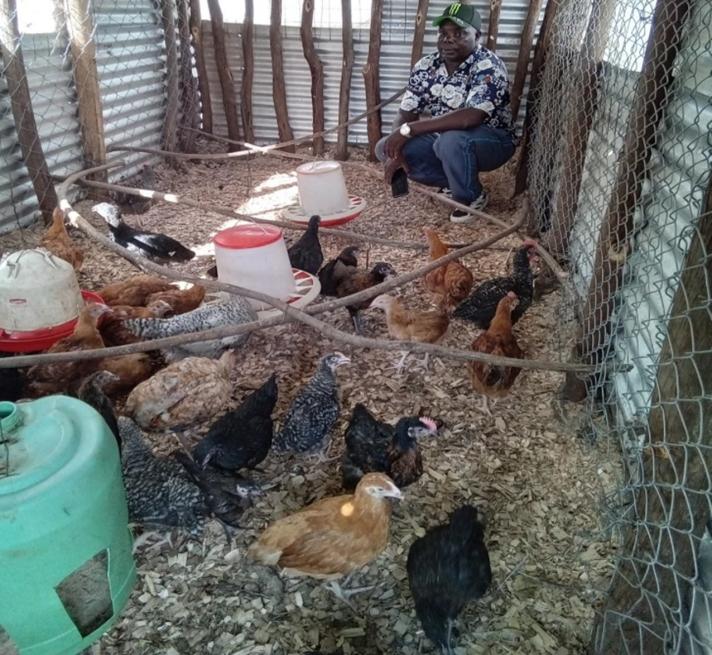
Poultry farming in refugee settings is gaining popularity. This is a worthy opportunity that development partners are promoting to diversify refugee livelihoods and increase access to animal-sourced foods, nutrition and incomes. The Food and Agricultural Organization (FAO) is implementing the EU Trust Fund-funded project in Kalobeyei, which in addition to providing chickens to households, supported the establishment of two poultry production units managed by refugees, thereby benefiting additional households and emerging commercial poultry producers.
This story highlights the advantages of embracing poultry production by refugees in Kalobeyei. It enhances the nutritional status of households and generates income for both producer groups and individual households. It showcases successful poultry production units and showcases the experience of a refugee farmer that is supporting his family back in Burundi with earnings from poultry farming. The observed change is an increase in the adoption of poultry farming and the benefits refugees are gaining from it.
Poultry production represents a livelihood opportunity that enhances food security, income and nutrition amongst the displaced populations. In many cases, refugees have relied on food assistance, however venturing into livestock poultry production and marketing can improve resilience and the self-reliance of refugee households and producer business groups. The initiative is supported by FAO through funding from the EUTF through the project “Enhancing Self-Reliance for Refugees and Host Communities in Kenya (ESRH”), that aims at ensuring better management and protection of refugees, enhance and support government capacity to roll-out the “Comprehensive refugee response framework (CRRF)” approaches to contribute to transforming the humanitarian model of assistance for refugees towards development-oriented solutions that enhance the self-reliance of refugees and host communities.
The project’s community impact
FAO identified over 1,200 refugee households in Kalobeyei to benefit from poultry production activities. This support also includes 14 community-based facilitators (CBFs) trained to promote livestock production and trade in Kalobeyei. 533 households received 6 chickens each, most of which multiplied, enhancing their access to meat, eggs, income, and manure for their kitchen gardens.
In Kalobeyei settlement, two poultry production units were established, each stocked with 600 chicks. Also, the units were provided with poultry production equipment and feeds. Using the Farmer Field School (FFS) approach, poultry farmers received assorted training on poultry production systems, feed formulation, disease control and management, marketing, and nutrition. In the last one year, over 3,200 refugee households in Kalobeyei settlement adopted poultry keeping as a livelihood, thanks to the FAO's training and mentoring activities. Poultry production units identified additional food-insecure households, provided them with chicks, and offered technical assistance for husbandry practices. Such households support their livelihoods from chickens provided.
Poultry units in Kalobeyei are also points for learning for emerging poultry producers and households and for school-going children following the reintroduction of agriculture in the Competency-Based Curriculum (CBC), where poultry units donated 400 chickens to Joy, Friends, Future and Kalobeyei Integrated primary schools in Kalobeyei to aid in practical learning. Additionally, poultry units in Kalobeyei donated 3,500 chickens to 588 most needy households to enable them to improve their livelihoods.Poultry farming has enabled refugees to improve their access to cash and food diversity, contribute to their children's education, and purchase seeds for their kitchen gardens. The EUTF-funded project has so far supplied 10,000 improved indigenous chickens (KALRO Kienyeji) to Kalobeyei settlement. While the chicken supplied and produced in Kalobeyei have immensely benefited the project-targeted households, it has also transferred superior genes for the upgrade of the local chicken breeds.
Several successful cases of refugees in Kalobeyei building their livelihoods through the EUTF project implemented by FAO have been documented.
One of the successful households is that of Mr. Buchumi, a 46-year-old refugee from Burundi who arrived in the Kalobeyei community in 2016. When he fled Burundi to seek asylum, he was unable to bring with him his family, which included his wife and five children, but he continues to support them back home. He worked as a motorcycle (Boda Boda) taxi rider and wage labourer at construction sites in Kalobeyei before FAO targeted him as a beneficiary of the EUTF project for Refugee and Host Community Self-Reliance. In 2022, Mr. Buchumi was one of the 533 households in the Kalobeyei settlement that received six chickens, starter feed and training in the Farmer Field School (FFS) programme from FAO.
Mr. Buchumi continues to get meat and eggs from his chickens, as well as money from the sales, to support himself and his family. For his kitchen garden, he uses manure from his chicken yard. He is a mentor to families who are passionate about chicken farming.
“Despite successes recorded by poultry-keeping households in the Kalobeyei settlement, the main challenges to poultry farming include limited and expensive feed and medicine, insufficient water for chickens, especially during dry periods, inadequate production equipment, and irregular immunization and treatment services,” says Mr. Buchumi.
Considering the magnitude of these challenges, if the increase in chicken farming, accessibility and affordability of production inputs, and availability of the market improves, Mr. Buchumi believes that poultry farming presents a significant possibility for food, income, and nutrition in refugee and host community households, making Kalobeyei integrated settlement and Kakuma camp a better home for them.
Details
- Publication date
- 17 June 2024
- Author
- Directorate-General for International Partnerships
- Region and Country
- Horn of Africa
- Kenya
- Thematic
- Improved migration management
- Strengthening resilience of communities
- Partner
- Food and Agriculture Organization

